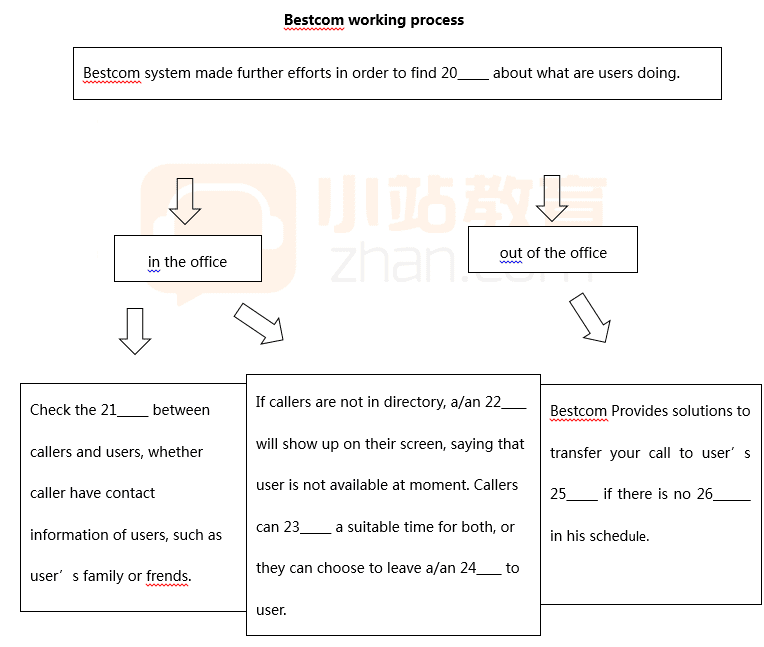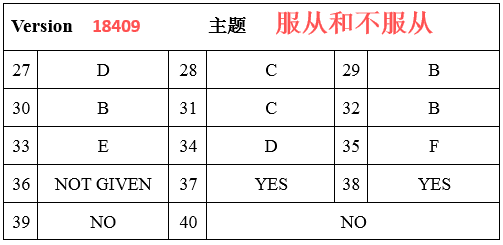如何提高雅思阅读效率呢?小编建议准备雅思阅读的童鞋,提高词汇量、熟练语法知识、学会快速阅读、学会定位。下面小编就和大家分享提高雅思阅读效率该怎么做,希望能够帮助到大家,来欣赏一下吧。
如何提高雅思阅读效率?
提高词汇量
雅思阅读效率的提高不是光掌握一些阅读方法就可以了,还要有扎实的基础。如果没有大量的词汇,看一篇文章,满眼都是#¥%&…这还怎么做题?所以同学们要提高雅思阅读词汇量。提高词汇量的办法很简单,就是需要大家踏踏实实坚持不断的反复背诵反复记忆。具体的背诵方法大家可以参考前面分享的如何高效备考雅思词汇。
语法知识熟练
雅思阅读的语法考察虽然不像托福考试,专门出了一些试题。但是却渗透在字里行间,对语法的要求更为高级。常考的语法知识点就是各种长难句的结构分析。雅思阅读文章中常见的从句有:名词性从句(宾语从句、主语从句、表语从句、同位语从句)、形容词性从句(定语从句)、非谓语结构(动词不定式、现在分词、过去分词),同学们只要掌握了以上几大知识点,语法应该不是大问题。
学会快速阅读
快速阅读是雅思阅读备考必须掌握的一项基本能力。快速阅读又包括两种技能:泛读和略读。泛读是指广泛阅读大量涉及不同领域的书籍,不需要掌握细节,只要了解书中主要内容即可。略读又称跳读(reading and skipping)或浏览(glancing),要求读者有选择地进行阅读,不重要的细节都可以跳过,需要抓住文章的重点内容。
学会定位
上面讲了快速阅读的方法,接下来我们具体分享快速定位做题的方法。雅思阅读做题最主要的技能就是快速定位。定位词一般是题目中变化性最小的词性才能充当定位词,一般情况下以具象名词为主,主要包括:首字母大写的信息,数字,时间,与人相关的信息(身份、职业),学科等、新鲜词汇和绝对生词。我们根据题干中的这些定位词到原文中找对应的信息,然后将原文与题干就行比较,最后得出答案。
雅思阅读材料:时间与幸福指数的关系
While on vacation in distant locales, people often find that time moves quite differently than in the places they’re used to. In the tropics, we settle into the grooves of “island time” and relax thanks to a more leisurely rhythm. A trip to a big city can leave us exhilarated but also drained by the energetic whir of life there.
据科技杂志Nautilus报道,当人们去远方度假时,往往会发现时间过得与平时很不一样。热带地区悠闲的节奏让我们习惯于“岛上的时间”,过得更加放松。去大城市令人兴奋,却也被充满活力的快节奏生活弄得筋疲力尽。
The different paces of different communities also seem to be connected to other cultural characteristics. Robert Levine and his colleagues have studied the speed of life in cities around the world and across the U.S. In a series of experiments they measured how fast solitary pedestrians in a downtown core covered a distance of 60 feet (being careful to exclude those who are obviously window shopping), timed how long it took to complete a simple commercial transaction, and recorded the accuracy of randomly selected clocks in the downtown business area. They found that places with a faster pace of life also had more robust economies (as measured by GDP per capita, average purchasing power, and average caloric intake), and that people in larger cities tended to move faster than those in less populated areas. They also found truth to the stereotype that people move slower in hotter places.
群体间不同的生活节奏是与他们的文化有关的。罗伯特?莱文和他的同事们对全球各个城市和美国各地的生活节奏做了一个调查。通过一系列的实验,他们计算出了每个城市里的人走过60英尺需要的时间(他们仔细地将其中明显是在逛街的人排除在外),计算了一桩买卖成交需要的时间,并且记录了在中心商业区随机挑选的时钟的准确性。他们发现节奏快的地方往往是那些经济更加发达的地方(通过对比人均GDP、平均购买力还有平均热量摄入),并且人们在大城市里比在人口少的地方走得更快。他们也发现了人们在热的地方走得更慢这一惯例。
So as you might expect, fast-moving people are associated with fast-moving economies. But does that faster life translate into greater happiness? In faster places (specifically, economically developed areas of North America, Western Europe, and Asia), people were more likely to smoke, less likely to take the time to help strangers in need, and more likely to die from coronary heart disease. Yet Levine and his colleagues found that residents in faster places tended to report feeling somewhat happier with their lives than those who lived in slower places. A city’s pace of life was indeed “significantly related” to the physical, social, and psychological well-being of its inhabitants.
正如你所想象的那样,快节奏的人们和高速增长的经济相关。但是快节奏的生活就意味着幸福么?在快节奏的地方(尤其是经济发达地区,如北美、西欧和亚洲),更多的人抽烟,更少的人会去帮助那些需要帮助的人,并且更容易死于冠心病。但是莱文和他的同事们发现,在快节奏城市生活的人觉得自己比那些生活在慢节奏城市的人更加幸福。一个城市的生活节奏明显与居民的身体健康、社会意识和心理状态息息相关。
Perhaps the higher reported rates of happiness simply reflect the fact that faster places have more robust economies. But the relationship between income and reported happiness is far from obvious. According to the “Easterlin paradox” (named after economist Richard Easterlin), once people have enough money to meet their basic needs, having more money is not necessarily correlated with higher self-reported happiness. Easterlin’s claims are controversial and not universally accepted; even if his theory is correct, wealthier nations might be happier overall if they address the basic needs to more of their people. In any case, the ongoing debate indicates that we need to tread carefully when making connections between happiness and overall economic factors.
也许更高的幸福指数反应出了这样一个事实:快节奏的城市拥有更好的经济发展。但是收入与幸福指数间的关系并不明显。根据伊斯特林悖论(以经济学家理查德?伊斯特林的名字命名),一旦人们拥有足够的钱满足基本的生活需求,收入与幸福指数关联得并不紧密。伊斯特林悖论存在着争议也没有被普遍接受,尽管他的理论是对的,在满足了更多人们的基本生活需求时,总的来说更富有的国家幸福指数会高些。无论如何,依旧持续着的争议告诉我们将幸福指数和整体经济因素进行关联时需要多加小心。
Among individuals in a society, busyness—or the feeling of busyness—seems to be an important factor in well-being. That feeling of busyness—of having a lot to do and too little time in which to do itis often associated with stress and anxiety. However in many contexts being “busy” is badge of honor: Busy parents are seen as devoted to their children’s well-being, the busy real estate agent must be closing lots of sales, and the busy lawyer can charge a premium hourly rate. In US studies, the happiest people reported that they were busy, in the sense that they had little excess time, yet did not feel rushed. Like big-city dwellers, they seemed to thrive at a faster pace.
对社会中的个体来说,忙碌——或者感觉忙碌——似乎是影响状态的重要因素。忙碌的感觉——有很多的事情要做,却没有多少时间的感觉经常带来压力与焦虑。但在很多的情况下,忙碌是一个光荣的标志:忙碌的父母被认为是为了让孩子过得好;忙碌的房地产经纪人则与客户更加亲密;忙碌的律师的时薪也更高。在美国的调查发现,幸福指数的人都很忙,也就意味着他们没有多余的时间,也不觉得匆忙。就好像大城市的居民们,他们似乎喜欢更快的生活节奏。
Levine’s work raises the intriguing possibility that an individual’s feelings about their use of time contribute as much or more to their happiness as does economics. Now the big challenge is to find out which way the causal chain works: Does the feeling of being active, yet not rushed, contribute to happiness? Or does happiness allow people to perceive their use of time in positive ways?
莱文的研究显示了对时间利用的个人感觉可能比经济更加影响幸福指数。现在的问题时需要找出这样的影响是怎样发生的:是因为充实并不匆忙的感觉令人幸福?还是幸福让人们更加积极地利用他们的时间?
雅思阅读材料:人变胖是什么原理
The discovery of the obesity gene in humans half a decade ago offered evidence that chronic weight gain is the consequence of a mismatch between nature and nurture. Simplistic explanations, such as blaming obesity on a drop in fat consumption, ignore scientific reality. In countries like India and China, obesity was virtually unknown until the introduction of a high-fat, western-style diet.
One well-known reason for this is that dietary fat converts to (转换为 )body fat more efficiently than does protein or carbohydrate, but recently scientists have uncovered what appears to be an equally important factor. Some researchers in universities are investigating the possibility that high levels of fat and fructose are mucking up(扰乱 ) our brain chemistry, and thereby muting the signals that would normally tell us to put down the fork. These signals are produced by peptides, which are regulated by a number of hormones. Under normal conditions these hormones help maintain a stable body weight by adjusting levels of the peptides that control eating. But a diet loaded with fat and fructose hampers the regulation of these hormones. Complicating matters still further is that the brain loses its ability to respond to these hormones as body fat increases -- so the obese are doubly penalized.
Other researchers are finding evidence that constant exposure to fat and sugar can cause some humans to crave (渴望)them as they do an addictive drug. A Princeton University psychologist recently showed that rats fed a high sugar diet were, when the sugar was removed, thrown into a state of anxiety similar to that seen in withdrawal from morphine or nicotine. Sarah Leibowitz, a neurobiologist, believes that frequent exposure to fatty foods may configure the brain to crave still more fat. She has shown in animal studies that galanin, a brain peptide that simulates eating behavior and decreases energy expenditure, increases when the animal eats a high-fat diet.
There are many factors contributing to the explosion of obesity in the United States, and the world, but the radical changes in the composition of our diet are first among them. While scientific work in this area is in its infancy, it's already clear that varying the amount of fat and other nutrients in the diet affects brain chemistry by activating certain genes, and this in turn directs our dietary preferences. By submitting ourselves to a steady dose of highly processed, sweet, high-fat foods, we have unwittingly entered into a dangerous experiment, the long term consequences of which are only now beginning to surface.
如何提高雅思阅读效率相关文章:
★ 雅思阅读考试效率低下的3个原因分析
★ 2020雅思复考指南收好这份“听说读写”全攻略









 扫一扫支付
扫一扫支付


